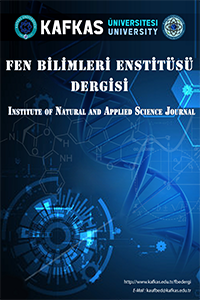Simvastatin’in Fare (Mus musculus C. Linnaeus) Karaciğeri Üzerine Etkilerinin Histopatolojik Yöntemler ile Araştırılması
Histopatoloji, Karaciğer, Mus musculus, Simvastatin
Simvastatin, Mouse (Mus musculus C. Linnaeus) to Investigate Methods and Histopathological Effects on The Liver
Histopatology, Liver, Mus musculus, Simvastatin,
___
- Adik, A. (2006). Nonalkolik Karaciğer Yağlanmasında Statin Tedavisinin Karaciğer Enzim Profili Üzerine Olan Etkileri. T.C. Haydarpaşa Numune Hastanesi, İç Hastalıkları Kliniği.
- Arslan, G. (2008. Yüksek dozda Simvastatin’in ratlarda oluşturduğu hepatotoksisite üzerine N-asetil sistein’in etkisi. Selçuk Üniversitesi, Sağlık Bilimleri Enstitüsü.
- Bilheimer, D. W., Grundy, S. M., Brown, M. S., ve Goldstein, J. L. (1983). Mevinolin and colestipol stimulate receptor-mediated clearance of low density lipoprotein from plasma in familial hypercholesterolemia heterozygotes. Proceedings of the National Academy of Sciences of the United States of America, 80 (13), 4124–4128.
- Chalasani, N. (2005). Statins and hepatotoxicity: focus on patients with fatty liver. Hepatology (Baltimore, Md.), 41 (4), 690–695.
- Crawford, M. ve DiMarco, J. (2003). Hiperlipidemi tedavisi. Içinde: Crawford Kardiyoloji. 1–18.
- Dujovne, C. A. (2002). Side effects of statins: hepatitis versus “transaminitis”-myositis versus “CPKitis”. The American Journal of Cardiology, 89 (12), 1411–1413.
- Endo, A. (1992). The discovery and development of HMG-CoA reductase inhibitors. Journal of Lipid Research, 33 (11), 1569–1582.
- Gotto, A. M. (2006). Statins, Cardiovascular Disease, and Drug Safety. The American Journal of Cardiology, 97 (8, Supplement 1), S3–S5.
- Hatzitolios, A. Savopoulos, C., Lazaraki, G., Sidiropoulos, I., Haritanti, P., Lefkopoulos, A., Karagiannopoulou, G., Tzioufa, V., ve Dimitrios, K., (2004). Efficacy of omega-3 fatty acids, atorvastatin and orlistat in non-alcoholic fatty liver disease with dyslipidemia. Indian Journal of Gastroenterology: Official Journal of the Indian Society of Gastroenterology, 23 (4), 131–134.
- Hsiang, B., Zhu, Y., Wang, Z., Wu, Y., Sasseville, V., Yang, W. P., ve Kirchgessner, T. G.,(1999). A novel human hepatic organic anion transporting polypeptide (OATP2). Identification of a liver-specific human organic anion transporting polypeptide and identification of rat and human hydroxymethylglutaryl-CoA reductase inhibitor transporters. The Journal of Biological Chemistry, 274 (52), 37161–37168.
- Kiortsis, D. N., Nikas, S., Hatzidimou, K., Tsianos, E., ve Elisaf, M. S. (2003). Lipid-lowering drugs and serum liver enzymes: the effects of body weight and baseline enzyme levels. Fundamental & Clinical Pharmacology, 17 (4), 491–494.
- Kiyici, M., Gulten, M., Gurel, S., Nak, S. G., Dolar, E., Savci, G., Adim, S. B., Yerci, O., ve Memik, F. (2003). Ursodeoxycholic acid and atorvastatin in the treatment of nonalcoholic steatohepatitis. Canadian Journal of Gastroenterology = Journal Canadien De Gastroenterologie, 17 (12), 713–718.
- LaRosa, J. C., He, J., ve Vupputuri, S. (1999). Effect of statins on risk of coronary disease: a meta-analysis of randomized controlled trials. JAMA, 282 (24), 2340–2346.
- Mahmoudi, M., Gorenne, I., Mercer, J., Figg, N., Littlewood, T., ve Bennett, M. (2008). Statins use a novel Nijmegen breakage syndrome-1-dependent pathway to accelerate DNA repair in vascular smooth muscle cells. Circulation Research, 103 (7), 717–725.
- Rallidis, L. S., Drakoulis, C. K., ve Parasi, A. S. (2004). Pravastatin in patients with nonalcoholic steatohepatitis: results of a pilot study. Atherosclerosis, 174 (1), 193–196.
- Topol, E. J. (2004). Intensive Statin Therapy — A Sea Change in Cardiovascular Prevention. New England Journal of Medicine, 350 (15), 1562–1564.
- Yang, H., Choi, M.-J., Wen, H., Kwon, H. N., Jung, K. H., Hong, S.-W., Kim, J. M., Hong, S.-S., ve Park, S. (2011). An Effective Assessment of Simvastatin-Induced Toxicity with NMR-Based Metabonomics Approach. PLOS ONE, 6 (2), e16641.
- ISSN: 2587-2389
- Yayın Aralığı: Yılda 2 Sayı
- Başlangıç: 2008
- Yayıncı: Kafkas Üniversitesi
İmmun Sistem Hücrelerinde CD Molekülleri
Şükran YEDİEL ARAS, Ebru KARADAĞ SARI
Kars İli 2013 Yılı Bal ve Polen Granüllerinin Analizi
Mizgin SÜLÜN, Mustafa Kemal ALTUNOĞLU, Gül Esma AKDOĞAN, Salih AKPINAR
Bazı Kirleticilerin Teleostların Ovaryumları Üzerindeki Histolojik Etkileri
Özlem ÖNEN, Pınar AKSU KILIÇLE, Sema İŞİSAĞ ÜÇÜNCÜ
Kars İli Kağızman İlçesi Atmosferik Polen ve Mantar Sporlarının Belirlenmesi
Şahin YALÇİN, Mustafa Kemal ALTUNOĞLU, Salih AKPINAR, Gül Esma AKDOĞAN
Kümes Hayvanları Atıklarının Biyogaz Üretim Potansiyelinin Belirlenmesi: Tokat İli Örneği
Neonatal Buzağı İshalleri ve Sepsis
Enes AKYÜZ, Amir NASERİ, Ekin Emre ERKILIÇ, Mustafa MAKAV, Erdoğan UZLU, Ali Haydar KIRMIZIGÜL, Gürbüz GÖKCE
Özlem Önen, Pınar AKSU KILIÇLE, Ali Nazmi Can DOĞAN
Bitki Biyoteknolojisinde Genetik Kaynakların Önemi
